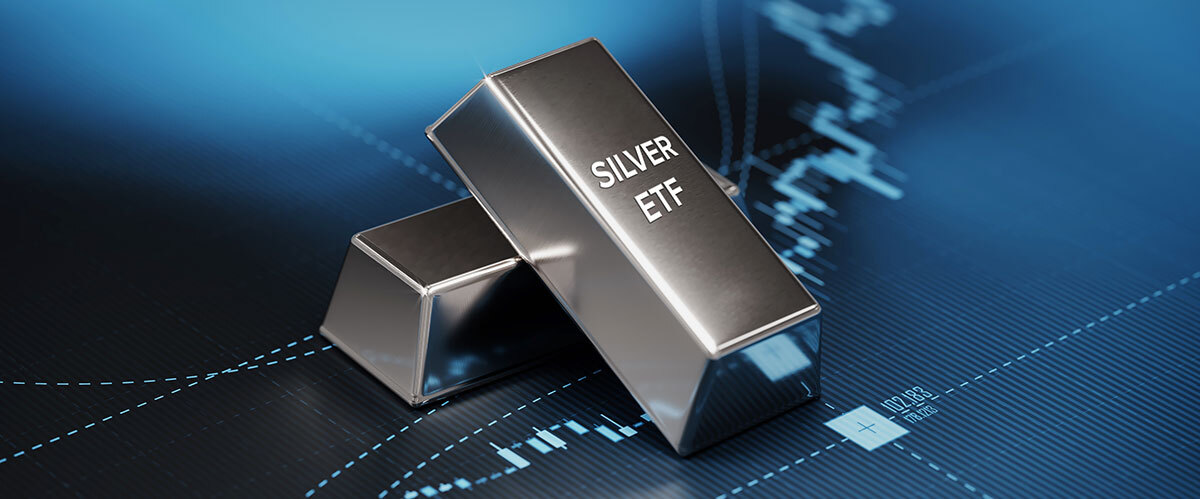Silver has long been a favoured investment avenue for Indians for its enduring value and stability. While acquiring silver through traditional means like bars, jewellery, and coins is common, the introduction of silver ETFs (exchange-traded funds) now offers a smart alternative. Launched in 2022 by SEBI, silver ETFs quickly captured investors’ interest and attained an asset base of approximately ₹1,800 crore by March 2023.
Given their widespread acceptance, let’s explore silver ETFs in detail and understand how this versatile asset can benefit your portfolio and offer long-term growth.
What are silver ETFs exactly?
Silver ETF is a commodity-based ETF offered by mutual fund houses that track the price of pure physical silver. These types of ETFs allow investors to get exposure to the silver market without the need to physically own or store the metal. Each unit of a silver ETF is backed by physical silver of exceptionally high purity.
Silver ETFs in India are listed on the National Stock Exchange (NSE) and the Bombay Stock Exchange (BSE). Note that a Demat and trading account is necessary to hold your funds and execute transactions on the exchange.
What makes investing in silver ETFs advantageous?
So now that you know what is a silver ETF, look at a few advantages of adding these investments to your portfolio:
- Hedge against economic downturns
Silver is often regarded as a protective asset during economic uncertainties, providing a hedge against currency devaluation, inflation, and even geopolitical risks. In volatile financial periods, silver prices often appreciate or maintain their value. This stability helps silver ETFs minimise risk in your investment portfolio and preserve capital.
- Limited or negative correlation with other asset classes
One of the most attractive features of silver ETFs is their low correlation with traditional asset classes like stocks and bonds. Silver usually moves independently of these assets, which means adding this commodity to your asset allocation will diversify your portfolio.
Their negative correlation with equities and bonds is most relevant in times of high market volatility when these traditional assets often underperform and yield low returns.
- High liquidity
ETFs are traded on major stock exchanges. Hence, you can buy or sell a silver ETF on the stock exchange at market prices throughout the trading day, just like stocks. This smooth transaction is beneficial for investors who may need to quickly adjust their portfolio in response to market movements or personal financial needs.
Moreover, when you invest in silver ETFs online, there is no hassle of dealing with the physical commodity. You save yourself from purity verification, storage concerns, theft risks, finding a buyer for selling, and sometimes hefty transaction fees.
- Increasing industrial demand
While silver is extremely valued for its aesthetic appeal in silverware and jewellery, it also possesses exceptional properties such as high thermal/electrical conductivity and corrosion resistance. These properties make it a useful component in critical applications such as smartphones, electronics, automobiles, solar panels, 5G networks, TV screens, and medical equipment.
The growth of industries like renewable energy and electronics in India can boost the demand for silver in the future. This growth may directly influence silver prices and, consequently, the performance of silver ETFs, which means more lucrative opportunities for investors.
- Transparent nature
One of the standout benefits of silver ETFs is their transparency. The Net Asset Value (NAV) of silver ETFs is directly linked to the current market price of physical silver. Thus, you have a current and accurate reflection of your investment’s value. This direct linkage helps you monitor your ETF value in real time and track minute-by-minute fluctuations in silver prices.
Such transparency is important for making calculated decisions, especially in financial markets, which are known for their volatility and unpredictable nature.
The bottom line
Silver ETFs offer an investment opportunity, even for small investors who may find direct silver ownership difficult due to its high price as a commodity. Moreover, benefits like hedging against inflation, low correlation with other asset classes, affordability, liquidity, diversification, and transparency make silver ETFs a valuable addition to your portfolio.
However, just like any financial product, silver ETFs, too, need consideration. Hence, pay attention to factors such as portfolio size, investment goals, expense ratio, tracking error, and market conditions when determining the appropriate allocation. This can help you optimise your investment strategy to achieve your goals and return expectations.



Average Rating